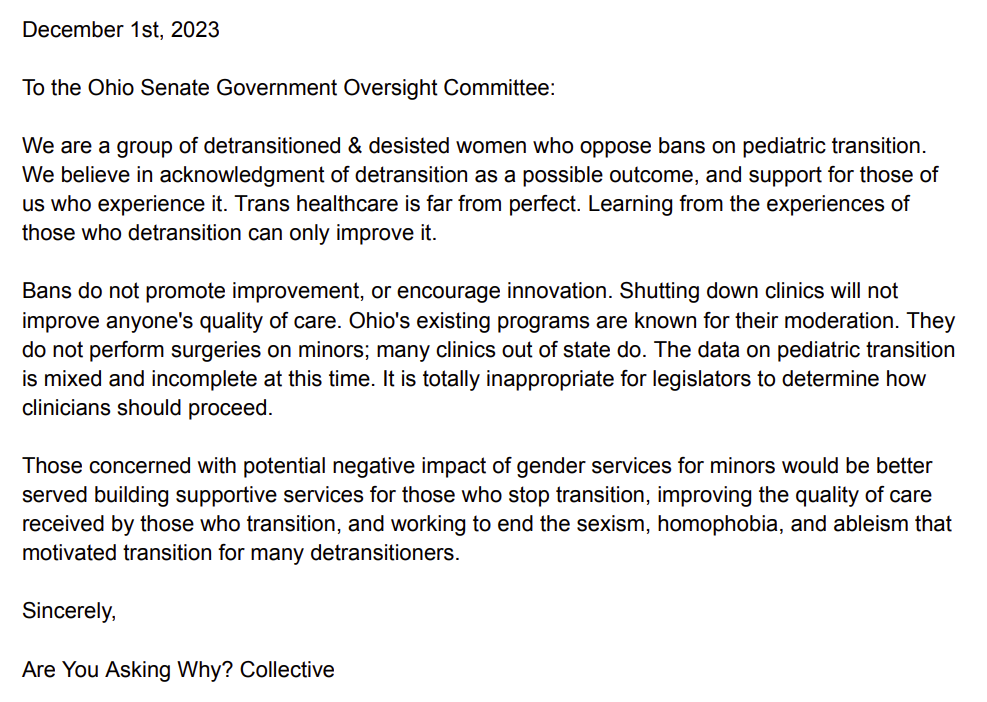Detransitioners Oppose Ohio’s Gender Affirming Care Ban
The inconvenient truth is even people who have detransitioned do not generally agree with attempts to ban gender affirming care for everyone.
by Evan Urquhart
The Ohio legislature is scheduled to vote today on a bill that would ban gender affirming care for youth, as well as the participation of trans girls in girls athletics. HB 68 has been in the works for months, and closely resembles anti-trans GOP legislation in other states, which have been pushed by far-right groups such as the Family Research Council. While the presence of detransitioners among the bill’s supporters has been well reported, the press has somehow failed to mention that detransitioners were also counted among the bills many opponents. One of their number, Carey Callahan English, is a resident of Ohio and was previously profiled by Jesse Singal in the Atlantic.
Here’s an excerpt from Callahan English’s testimony against the bill:
screenshot from a PDF of Callahan English’s testimony against HB 68
In addition to Callahan English, Lucy Kartikasari of the Netherlands submitted testimony in which she pushed back against widespread misinformation, pushed by anti-trans activists, about transition care for youth in Europe. Kartikasari is a detransitioner who does not regret her previous transition and has spoken out about having been tricked and misrepresented in an anti-trans documentary that aired in her home country. “As a detrans woman, I cannot stand by and allow others to utilize my body as a straw man argument focused around regret. My body is not a commodity to be weaponized to harm innocent children grappling with pain and dysphoria,” she wrote.
Devin Cantu, a detrans nonbinary person who was assigned female and lives as her birth gender, also wrote in opposition to HB 68. “I would like for detransition to be discussed as a plan B just in case that youth does end up detransitioning. Please realize that detransition does not equate to regret. Like I said, I do not regret my transition and my detransition did not mean my life was over or ruined.”
At least seven detransitioners also signed a letter opposing the legislation, as part of a collective of 15 detransitioned and desisted women. Like the others mentioned above, the letter advocated for more resources for people who detransition and included criticisms of transgender healthcare, but expressed the view that banning treatment would not improve healthcare for anyone, including detransitioners.
screenshot from a PDF of the letter opposing HB 68 from the Are You Asking Why? collective
The experiences and perspectives of detransitioners are varied, but do not seem well-represented by media accounts that allow anti-trans activists in the community to represent the whole. Reporting on HB 68 for the Ohio Capital Journal and the local ABC affiliate, ABC 13, both mentioned detransitioners who supported the bill without noting that detransitioners were also among the bill’s opponents, such as Richard Anumene of California. Unlike that of Anumene, we were unable to find any media coverage of Callahan English’s testimony.
While there is much still to learn about the small group of people who reverse their gender transition, the research that is available suggests that those opposing HB 68 are more representative of detransitioners. Media outlets reporting on HB 68 and other bills have largely failed to capture that reality, instead echoing the talking points of activists who falsely paint detransition as a universally negative experience characterized by deep regret and opposition to transition for others.
In the bill’s final hearing on December 7th, top pediatricians from Ohio’s nationally acclaimed children’s hospitals spoke in opposition to the bill, explaining to lawmakers that only 35 percent of children being seen at gender clinics in the state are prescribed hormone therapy, and none are given surgery. This stands in contrast with the false picture of gender-affirming care painted by activists which claim that affirming providers act as a rubber stamp for medical treatment. Affirming treatment more accurately describes an attitude by providers that their job isn’t to challenge or dispute a patient’s self-conception or attempt to steer them towards any particular outcome. Despite the opposition of the trans community, the medical community, and many in the detransition community the bill is still believed to have a high chance of passing later today, a testament to the high priority Republicans have placed on anti-trans legislation.
UPDATE: After looking more closely at news reports and consulting sources in Ohio, we did find a second detransitioner from Ohio, Morgan Keller, who testified in support of the affirming care ban. Keller transitioned as an adult and detransitioned after a religious conversion. Her story has been covered by the Daily Caller and other far right and Christian websites. This brings the total of Ohio detransitioners to testify to two, one opposed and one in favor of the care ban.
CORRECTION: An earlier version of this paragraph mentioned Corrinna Cohn as among detransitioners who were covered in other outlets. Cohn, of Indiana, supports the ban on gender-affirming care, but is a transgender woman who has not detransitioned.




